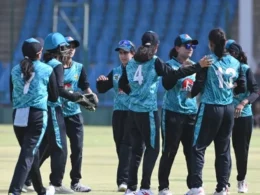Former Pakistan Test cricketer Shabbir Ahmed has stepped down as coach of District Dera Ghazi Khan, expressing deep disappointment with the state of grassroots cricket. His resignation comes after continued frustration over what he described as a lack of merit and rampant favoritism, hindering the growth of young talent in local cricket.
Taking to social media, Shabbir aired his grievances, stating, “I had pledged to serve cricket at the grassroots level, but the injustices and systemic issues have made it impossible to work effectively.” His remarks point to a growing sense of disillusionment with the way cricket is managed at the district level, highlighting how external influences and political connections override merit-based selections.
“Merit Is Ignored, Politics Prevails”
The former fast bowler, who once represented Pakistan on the international stage, did not hold back in his criticism of the system. Shabbir emphasized that his decision to leave was driven by the “grouping, political affiliations, and ministerial connections” that plague grassroots cricket.
“In our system, merit is constantly overlooked. One boy works hard all year, only for another to take his place because of a recommendation,” Shabbir lamented, painting a grim picture of how favoritism undermines the aspirations of dedicated young cricketers.
Shabbir, whose international career spanned from 1999 to 2007, expressed pain at witnessing the current state of Pakistan cricket. He pointed to Pakistan’s recent loss to Bangladesh as a symptom of deeper, structural problems within the country’s cricketing framework. “These issues are why our cricket has reached this low point,” he said, adding that his experience at the district level had left him disheartened.
Challenges of Grassroots Cricket
Shabbir Ahmed’s resignation sheds light on the ongoing challenges faced by local cricket in Pakistan, where systemic corruption, favoritism, and political interference have long hindered talent development. The former cricketer, who enjoyed a successful Test career as a fast bowler, had returned to his roots with the hope of nurturing the next generation of cricketers. However, he now departs with a heavy heart, unable to continue amid what he sees as an insurmountable system of injustices.
His statement, “Whose buffalo bats, his system works,” refers to the widely acknowledged issue of people with influence manipulating the system to their advantage, allowing unqualified players to leapfrog deserving candidates. Such practices, according to Shabbir, prevent cricket from progressing at the grassroots level, stifling the dreams of talented players who rely on merit.
No National-Level Role from PCB
Adding to his disappointment, Shabbir revealed that the Pakistan Cricket Board (PCB) had not approached him for any role in the national cricket structure, further complicating his decision to step away from grassroots cricket. “The PCB has not made any offer to me in the existing structure at the national level,” he noted, reflecting on what he perceives as a lack of recognition for his efforts and experience.
Despite his exit, Shabbir expressed a lingering passion for cricket and a desire to contribute to the sport, but under a fair and merit-based system. He hopes to see genuine reforms within the cricket structure, starting from the grassroots level, to bring integrity and growth back to the game.
The Need for Reform
Shabbir Ahmed’s departure serves as a reminder of the persistent challenges that local cricket faces in Pakistan. His candid remarks echo the frustrations of many who feel that the sport, particularly at the grassroots level, is marred by politics, nepotism, and a lack of accountability.
The cricket community has long called for greater transparency and structural reforms to ensure that young talent can thrive based on merit, rather than influence. With Shabbir’s exit, the conversation around these issues is likely to gain further traction, raising questions about the future of Pakistan’s cricket development programs.
Shabbir Ahmed, once a promising player from a small town, had hoped to give back to the cricketing community that nurtured his own career. Now, as he bids farewell to his coaching role in Dera Ghazi Khan, he leaves behind a stark message: without addressing the systemic flaws, the future of Pakistan cricket remains uncertain.









